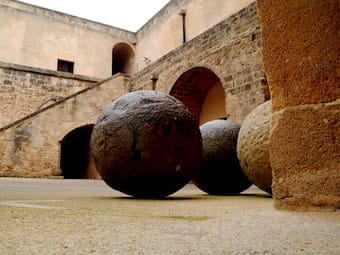Stone munitions in the courtyard of the Castle of Otranto, southern Italy. It was here that poor Conrad was found dashed to pieces under a grotesquely outsized knight’s helm and a heap of sable feathers. Walpole lent verisimilitude to his Gothic romance by borrowing location and names from the history of Manfred of Sicily (1232-1266), who was lord of the fortress of Otranto on the Adriatic coast. At first, Manfred governed Sicily as regent for his nephew Conradin, son of Manfred’s brother Conrad; but Manfred usurped Conradin in 1258, putting himself on a collision course with the Pope. He was killed in the Battle of Benevento on February 26th, 1266.
IN the mean time, some of the company had run into the court, from whence was heard a confused noise of shrieks, horror, and surprise. Manfred, who began to be alarmed at not seeing his son, went himself to get information of what occasioned this strange confusion. Matilda remained endeavouring to assist her mother, and Isabella stayed for the same purpose, and to avoid showing any impatience for the bridegroom, for whom, in truth, she had conceived little affection.
The first thing that struck Manfred’s eyes was a group of his servants endeavouring to raise something that appeared to him a mountain of sable plumes. What are ye doing? cried Manfred wrathfully; where is my son? A volley of voices replied, Oh! My Lord! the Prince! the Prince! the helmet! the helmet! Shocked with these lamentable sounds, and dreading he knew not what; he advanced hastily, — but what a sight for a father’s eyes! — he beheld his child dashed to pieces, and almost buried under an enormous helmet, an hundred times more large than any casque ever made for human being, and shaded with a proportionable quantity of black feathers.
Questions for Critics
1. What is the author aiming to achieve in writing this?
2. Note any words, devices or turns of phrase that strike you. How do they help the author communicate his ideas more effectively?
3. What impression does this passage make on you? How might you put that impression into words?
Based on The English Critic (1939) by NL Clay, drawing on The New Criticism: A Lecture Delivered at Columbia University, March 9, 1910, by J. E. Spingarn, Professor of Comparative Literature in Columbia University, USA.
Précis
Soon the commotion in the castle courtyard could not be ignored. The boy’s sister and his bride-to-be stayed behind to look after his mother, who had fainted, while Manfred went to see what was going on. There he found his son Conrad crushed beneath a grotesquely large helmet, with black feathers scattered all around. (54 / 60 words)
Soon the commotion in the castle courtyard could not be ignored. The boy’s sister and his bride-to-be stayed behind to look after his mother, who had fainted, while Manfred went to see what was going on. There he found his son Conrad crushed beneath a grotesquely large helmet, with black feathers scattered all around.
Variations: 1.increase the length of this precis to exactly 60 words. 2.reduce the length of this precis to exactly 50 words. 3.introduce one of the following words into the precis: about, despite, just, may, or, ought, whereas, whether.
About the Author
Archive
Word Games
Sevens Based on this passage
Suggest answers to this question. See if you can limit one answer to exactly seven words.
Variations: 1.expand your answer to exactly fourteen words. 2.expand your answer further, to exactly twenty-one words. 3.include one of the following words in your answer: if, but, despite, because, (al)though, unless.
Jigsaws Based on this passage
Express the ideas below in a single sentence, using different words as much as possible. Do not be satisfied with the first answer you think of; think of several, and choose the best.
Spinners Find in Think and Speak
For each group of words, compose a sentence that uses all three. You can use any form of the word: for example, cat → cats, go → went, or quick → quickly, though neigh → neighbour is stretching it a bit.
This exercise uses words found in the accompanying passage.
1 Frantic. Long. Servant.
2 Lamentable. Nothing. Nuptial.
3 Amazement. Group. Matter.
Variations: 1. include direct and indirect speech 2. include one or more of these words: although, because, despite, either/or, if, unless, until, when, whether, which, who 3. use negatives (not, isn’t, neither/nor, never, nobody etc.)
High Tiles Find in Think and Speak
Make words (three letters or more) from the seven letters showing below, using any letter once only. Each letter carries a score. What is the highest-scoring word you can make?
Your Words ()
Post Box : Ask Nicholas
Grok : Ask Grok
You are welcome to share your creativity with me, or ask for help with any of the exercises on Clay Lane. Write to me at this address:
See more at Post Box.
If you like what I’m doing here on Clay Lane, from time to time you could buy me a coffee.
Buy Me a Coffee is a crowdfunding website, used by over a million people. It is designed to help content creators like me make a living from their work. ‘Buy Me a Coffee’ prides itself on its security, and there is no need to register.
Related Posts
Picture: By Johannes Moreelse (?1602-1634), Wikimedia Commons. Public domain.. Source.
Posted February 24
Horace Walpole, a loyal patron of Vauxhall pleasure gardens, visits newly-opened rival Ranelagh gardens in Chelsea.
Picture: By Canaletto (1697–1768), Wikimedia Commons. Licence: Public domain.. Source.
Posted March 26 2019
Picture: © Fir0002/Flagstaffotos, via Wikimedia Commons. Licence: GFDL v1.2.. Source.
Posted June 16 2017






